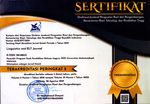An Ethnographic Research of English Learning Objectives in Junior High School
Abstract
This study aims to identify and analyze the objectives of learning English at SMP Al-Wildan International Islamic School. This study used a qualitative approach with ethnographic method. Data were collected through observations, interviews, and documentation review. Data analysis was carried out based on the model using domain analysis, taxonomy, componential and cultural theme analysis. The purpose of learning English at SMP Islam Al- Wildan International School was directed at mastering linguistic, strategic, sociocultural, actional and discourse competencies. The principles of language learning with a literacy approach involved interpretation, collaboration, convention, cultural knowledge, problem solving, reflection, and language functions. In terms of the process of learning English at SMP Islam Al-Wildan International School, the results suggest that it was very good and effective in improving the competence of mastering English because all the learning processes carried out were conducted based on careful planning
Keywords
Full Text:
PDFReferences
S. O’Neill, “A case study of learning in English as a foreign language (EFL) in Japan: High school students’ English proficiency levels and fostering positive cross-cultural attitudes,” Int. J. Pedagog. Learn., 2008, doi: 10.5172/ijpl.4.5.104.
S. C. Huang, “Learning experience reigns–Taiwanese learners’ motivation in learning eight additional languages as compared to English,” J. Multiling. Multicult. Dev., 2019, doi: 10.1080/01434632.2019.1571069.
S. Eshghinejad, “EFL students’ attitudes toward learning english language: The case study of Kashan University students,” Cogent Education. 2016, doi: 10.1080/2331186X.2016.1236434.
J. W. T. Huang, “Predicting and Reading Together: the Role of Collaborative Learning in Facilitating Reading Comprehension: 預測-驗證閱讀策略融入小組合作閱讀提升英語為外語學習者閱讀理解力之效益研究,” English Teach. Learn., 2023, doi: 10.1007/s42321-022-00111-y.
H. Zhang, Y. Dai, and Y. Wang, “Motivation and second foreign language proficiency: The mediating role of foreign language enjoyment,” Sustain., 2020, doi: 10.3390/su12041302.
P. Black and D. Wiliam, “Inside the Black Box : Raising Standards Through Classroom Assessment By Paul Black and Dylan Wiliam,” Assessment, 1998.
E. Z. Topkaya and H. ÿelik, “Non-native English Language Teachers⿿ Perceptions of Professional Development: Implications for Career Stages,” Procedia - Soc. Behav. Sci., 2016, doi: 10.1016/j.sbspro.2016.10.003.
K. S. Chambless, “Teachers’ Oral Proficiency in the Target Language: Research on Its Role in Language Teaching and Learning,” Foreign Lang. Ann., 2012, doi: 10.1111/j.1944-9720.2012.01183.x.
J. H. Sullivan, “Taking charge: Teacher candidates’ preparation for the oral proficiency interview,” Foreign Lang. Ann., 2011, doi: 10.1111/j.1944-9720.2011.01129.x.
R. M. Gagne, W. W. Wager, K. C. Golas, J. M. Keller, and J. D. Russell, “Principles of instructional design, 5th edition,” Perform. Improv., 2005, doi: 10.1002/pfi.4140440211.
D. L. Freeman and M. Anderson, “Techniques & Principles in Lnaguage Teaching,” Oxford Univ. Press, 2011, doi: 10.1016/s1359-6349(10)70108-7.
M. A. Diane Larsen-Freeman, Techniques and Principles in Language Teaching 3rd edition. 2013.
K. Anderson, “Isabel Hofmeyr. Dockside Reading: Hydrocolonialism and the Custom House. Durham: Duke University Press, 2022. Pp. 136. $84.95 (cloth).,” J. Br. Stud., 2023, doi: 10.1017/jbr.2023.53.
W. M. Rivers, Teaching Foreign Language Skills Rev Ed. 2019.
J. M. O’Malley and A. U. Chamot, “Learning strategies: models and materials,” in Learning Strategies in Second Language Acquisition, 2012.
G. Yule, The Study of Language 6th Edition. 2016.
R. M. Golinkoff, “On transition, continuity, and coupling: An alternative approach to communicative development,” Tranisistion From Prelinguistic to Limguistic Commun., 1983.
L. Ortega, Understanding Second Language Acquisition. Routledge, 2014.
K. J. Krahnke, S. D. Krashen, and T. D. Terrell, “The Natural Approach: Language Acquisition in the Classroom,” TESOL Q., 1985, doi: 10.2307/3586280.
J. Van Maanen and J. P. Spradley, “Participant Observation.The Ethnographic Interview.,” Adm. Sci. Q., 1980, doi: 10.2307/2392270.
D. M. A. Lexy J. Moleong, “Metodologi Penelitian Kualitatif (Edisi Revisi),” PT. Remaja Rosda Karya, 2019, doi: 10.1016/j.carbpol.2013.02.055.
DOI: https://doi.org/10.31764/leltj.v12i2.27747
Refbacks
- There are currently no refbacks.
Copyright (c) 2024 Sahri Suwandi, Rifari Baron, Adi Permana

This work is licensed under a Creative Commons Attribution-ShareAlike 4.0 International License.
_____________________________________________________
Linguistics and ELT Journal
p-ISSN 2339-2940 | e-ISSN 2614-8633

LELTJ is licensed under a Creative Commons Attribution-ShareAlike 4.0 International License.
_____________________________________________________
LELTJ is abstracting & indexing in the following databases:
_____________________________________________________
LELTJ Editorial Office:













